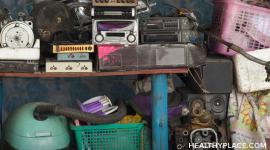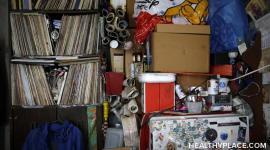What Is Hoarding? Definition of Hoarding
A Working Definition of Hoarding
You've probably seen a working definition of hoarding in action on the tv show "Hoarders." People who engage in excessive or extreme hoarding save items regardless of worth and have persistent difficulty parting with them. This can cause immense amounts of clutter that takes up usable living spaces and gets in the way of everyday life. The hoarding can become so bad that a narrow pathway, winding through the massive stacks of clutter is the only way to move around.
Classic Hoarding Definition
Here's a more academic hoarding definition:
Compulsive hoarding refers to a disorder characterized by difficulty throwing away items that appear to carry little or no worth to the average person. This results in a massive accumulation of clutter and debris that makes living and workspaces difficult to navigate and impossible to use as intended. The excessive clutter can lead to unsanitary environments, causing significant health issues for the ill person and those nearby.
In order to receive an official diagnosis of compulsive hoarding, the individual must experience severe anxiety or distress over the thought of discarding any of the accumulated items and the accumulation must impair normal daily life. People with hoarding disease aren't just messy or collectors. The clutter and mess that occurs with hoarding eclipses that of someone who simply doesn't care to keep a neat home or office. Unlike collectors, hoarders do not maintain or organize the items they keep.
Excessive Behaviors and Compulsions Define Hoarding
Excessive behaviors and compulsions define hoarding and differentiate the disorder from even the most avid and diverse hobby collector. Think about it this way:
Imagine that you collect matchbooks, shot glasses, and foreign coins and that you've done so for many years, perhaps even since your youth. You wouldn't just stack the shot glasses you've collected against a wall in a hallway or shove your now massive matchbook collection in a pile on the kitchen counter. Most likely, you'd have a special display for your shot glasses and the favorite matchbooks you've acquired. Perhaps you'd keep the rest neatly organized in a trunk or other specific container. Certainly, you'd have an album with acid-free paper pages, especially for the purpose of organizing and keeping your stamps. People may jokingly quip that you hoard stamps or shot glasses, but that's exactly what it is – a joke.
People who exhibit hoarding signs, symptoms and behaviors, collect just about everything and they don't organize the items into separate categories, containers, or display cases. They pile them up in hallways (often up to the ceiling), on dining tables, coffee tables, and in the center of floors. It can get so bad that they even cover up their beds, showers, and bathroom counter space. When people suffering from hoarding disease collect live animals, the animal waste, fur, dander, and subsequent insect infestations can become overwhelming, leading to considerable health risks for both humans and animals.
Diagnostic Definition of Hoarding Altered by DSM-5
The DSM-5 alters the definition of hoarding diagnostic criteria, listing it as a separate diagnosis in the new chapter on obsessive-compulsive and related disorders. Mental health professionals believe this will increase access to hoarding treatment for people suffering from the condition. This new classification of the disorder will ease barriers to professional help for the millions of Americans who suffer from the disorder in varying degrees.
APA Reference
Gluck, S.
(2022, January 10). What Is Hoarding? Definition of Hoarding, HealthyPlace. Retrieved
on 2026, March 1 from https://www.healthyplace.com/ocd-related-disorders/hoarding-disorder/what-is-hoarding-definition-of-hoarding



